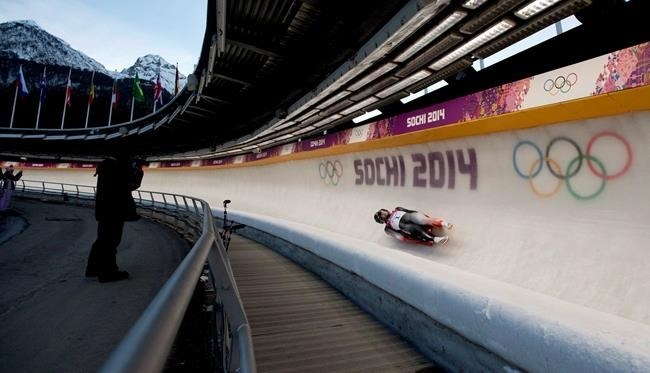
FILE PHOTO - Canadians Tristan Walker and Justin Snith race in the first of two races to end up with a 4th place finish in the Men's Doubles Luge at the Sochi Winter Olympics in Krasnaya Polyana, Russia, Wednesday, Feb. 12, 2014. The latest revelations of Russian doping had Canada's luge team talking at breakfast Friday morning, Dec. 9, 2016 in Whistler, B.C.
Image Credit: THE CANADIAN PRESS/Jonathan Hayward
December 10, 2016 - 6:00 AM
The latest revelations of Russian doping had Canada's luge team talking at breakfast Friday morning in Whistler, B.C.
When you've finished fourth in the Olympic Games, it gets you thinking.
Calgarians Sam Edney, Alex Gough, Justin Snith and Tristan Walker missed out on a medal by a tenth of a second, placing fourth in the team relay at the 2014 Winter Olympics in Sochi.
An independent investigator appointed by the World Anti-Doping Agency — Canadian lawyer Richard McLaren — released a second report Friday detailing Russian government involvement in doping from 2011 to 2015.
The report submitted to the International Olympic Committee concluded the doping sample bottles of 15 Russian medallists in Sochi had been tampered with.
Also among the findings was six Russian winners of 21 Paralympic medals had tampered sample bottles.
No names were included in the report.
No Russian luger tested positive from Sochi. The host team took the silver medal in the team relay and the president of the Russian luge federation insists they weren't dirty.
"I am convinced that all of our athletes are clean and the silver medals that we won at Sochi are well deserved," Natalia Gart said according to the BBC.
Canada's luge team races a World Cup in Whistler on Saturday.
While they waited for their wayward sleds delayed by weather to arrive from Vancouver to start training, there was time to ponder the latest bombshells to hit Olympic sport.
"It was a topic of conversation at the breakfast table today," Edney said from Whistler. "It's just wondering what if, what's going to happen and what comes out of this?"
McLaren released an initial report citing Russian state-sanctioned and systematic doping in July.
Friday's sequel went further, chronicling cheating and cover-ups involving more than 1,000 athletes in 30 sports. The report also found the Russian doping program corrupted the 2012 London Olympics on an "unprecedented scale."
McLaren said his findings were based on irrefutable forensic evidence, including DNA analysis.
The International Olympic Committee declared Friday it will retest all 254 urine samples collected from Russian athletes in Sochi.
Retests may not yield a rash of doped samples, however.
The McLaren report said several Russian athletes had samples taken during the Sochi Games swapped out for their own clean urine that was being stored elsewhere.
Russian authorities have declared the McLaren report out of step with reforms they've taken and have threatened unspecific legal action.
Since the Russian doping scandal broke earlier this year, it's become common for athletes to contemplate their Olympic results changing long after they've competed.
Russia edged Canada's figure skaters out for gold in the team competition in Sochi. Canadian pair Meagan Duhamel and Eric Radford were fifth in the figure skating pairs with two Russian teams making the podium.
Canadian short-track speedskater Charle Cournoyer finished third behind a Russian champion in the 500 metres.
Luge hasn't traditionally been a sport rife with doping, Edney said. The three-time Olympian wants it to stay that way.
"We all want to compete in clean sport and that's across the board," Edney said. "We hope out of this report, there's a big push to ensure that every athlete can have the opportunity to compete in fair sport."
McLaren said their investigation found male DNA in the urine samples of a pair of female hockey players from Russia, which finished sixth in Sochi.
Canadian women's hockey team veteran Hayley Wickenheiser, who is a member of the IOC's athletes' commission, says sport organizations that are supposed to protect athletes need to do more.
"Focusing on individuals and not the system is not the answer," Wickenheiser told The Canadian Press. "There (are) clear indications this is much larger than any individual athlete."
Double Olympic pole vault champion Yelena Isinbayeva of Russia joined Wickenheiser on the 18-member athletes' commission in August when Isinbayeva was elected to it in Rio.
Isinbayeva, who didn't compete in Rio because the entire Russian track team was banned, was named board chair of Russia's suspended anti-doping agency earlier this week.
"My hope with Isinbayeva is she will stand for what is most important, the clean athlete, despite incredible pressure from a state-sponsored cover-up," Wickenheiser said. "This will not be easy."
— With files from The Associated Press
News from © The Canadian Press, 2016